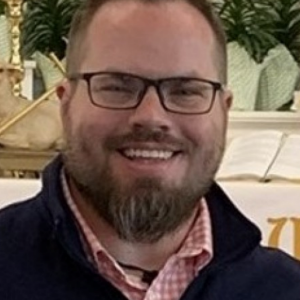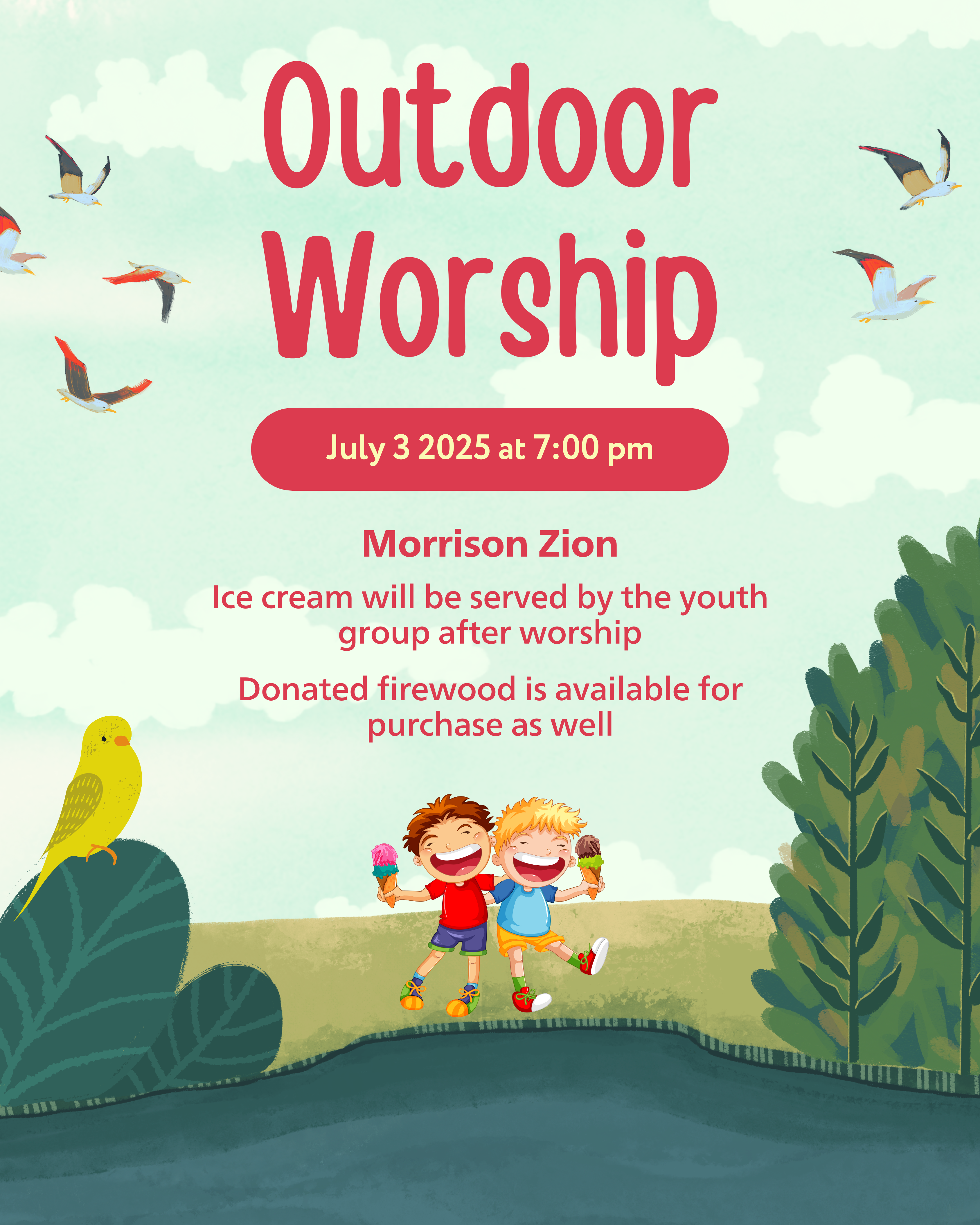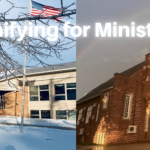The Christian Answers Doubt with Faith
Trust God’s Powerful Water
We are ___________________
_______ even when it doesn’t _________ __________
God ___________ a _________________
Waters that ___________ and __________
Welcome to worship today at Morrison Zion Lutheran Church. We exist to glorify God. We have set out to do this by gathering around the Gospel so that we may grow in the Gospel and go to others with this Gospel.
Grace and peace to you from God our Father and from Jesus Christ, our Lord:
There is not too small of a body of water near us, Lake Michigan. I grew up in the Midwest in Kansas City and to journey to a big body of water was a big trip. Maybe for some of you that first trip to the ocean is/was something special. Lake Michigan is big but not like the ocean.
That’s one of my favorite memories from when I was a kid. I was about 8-9 years old and my whole family took a trip. I was the youngest. My oldest sibling was 10-years older and just graduated high school. We rented an RV and we drove all the way to California. On the way there, we stopped in Colorado and saw the mountains. On the way back, we went to the Grand Canyon. This is back before Smart phones and all the GPS’s so you had to have all the maps and the Atlases. I loved to map out where we were going and follow along as we traveled around. I would sit up on that part above the driver’s seat in the RV as we were going. It was just so much fun to see our trip as we were heading out to this body of water out there.
It’s fun to go on trips. Sometimes, though, getting to your destination is not always easy and traveling with people is not always easy. People may be telling you that you’re going the wrong way, or sometimes a child or two is complaining, “When are we going to get there?” “Are we there yet?” “Are we there yet?” “Are we there yet?”
For the Israelites, they had approached this body of water, this powerful sea, the Red Sea. When they got there, how were they feeling? They had been released from captivity by the power of God, but how were they feeling when they got to that water? Moses writes what happens. In Verse 10, it says: As Pharaoh approached, the Israelites looked up, and there were the Egyptians, marching after them. They were terrified and cried out to the LORD. They said to Moses, “Was it because there were no graves in Egypt that you brought us to the desert to die? What have you done to us by bringing us out of Egypt? Didn’t we say to you in Egypt, ‘Leave us alone; let us serve the Egyptians’? It would have been better for us to serve the Egyptians than to die in the desert!” Here they are, they had been complaining to God when they were in captivity. “God, here us, release us from Egypt!” Then God finally does and then they get out and what do they do? They continue to complain.
Are we like these Israelites? We are complainers. We tend to get out of one difficulty and we ask God, “Help us with this! Help us with this!” And then we get into something else and say “God, maybe that other thing was better. Take me back to that thing.”
But we have to look a little bit at the journey of the Egyptians and say it’s interesting where they were. They were up against this big body of water, but God had them go that way instead of going the normal way. If you know a little bit of the geography of the Middle East from Egypt to Israel, how did people always go? They didn’t go by sea. They went by land. But at the end of Chapter 13, before we got to this section, God actually explains why He didn’t have them go up through the land. He said that if they would go that way, they would start facing some opposition, maybe some Egyptians that would fight them or the Philistines, and they would meet all these other people and they would be afraid. Then what would they do? They would turn back. They would turn back to Egypt and say “We don’t want to face these difficulties.” They would complain and go back to what they thought was better. So God shows us, too, that while we are complainers and we are complaining, God often makes things a little bit different than we expect, but it is for our good.
But as the Israelites are there, you can imagine being at Lake Michigan, maybe in Manitowoc and heading over to Grand Rapids, where the ferry goes. They didn’t have a ferry. Then this army is approaching them and this whole time, the Israelites and the Egyptians had not fought. God had delivered them through the plagues and the Passover. So this army is approaching and the Israelites think “Is this the first time we are going to have to fight the Egyptians?” They are afraid and they are terrified. But they have no boat. They have nothing to rescue them, so they are afraid. But what does Moses tell them?
Moses answers in Verse 13. He says, “Do not be afraid. Stand firm and you will see the deliverance the LORD will bring you today. The Egyptians you see today you will never see again. The LORD will fight for you; you need only to be still.” Moses was telling the people that they could trust even when it doesn’t make sense. For them, this was ludicrous! They are standing at the sea. The Egyptians are coming. And “God, why would you do this? Why would you lead us out only to die?” But Moses reminds them and tells them, “God will fight for you. You can trust even though this doesn’t make any sense to you.”
Have you had similar times in your life? The way that life has taken you, the journey that God has brought you to, where you feel like you are on the edge of this disaster and this disaster or this terrible thing and you are just crying out to God, “Why? Why would you let this happen? Do you even understand? Do you care about me?” We need to hear the words of Moses to say that we can trust Him, to be still and know that God will fight.
Notice here what Moses doesn’t say to them. He doesn’t say “Okay, pick up your armor, your weapons, and don’t be afraid because you can do this. You’ve got it!” What does he say? God says “I’ve got this. I will fight for you. I will help you. In fact, this is so much greater than you could do.” That’s the whole point of why He didn’t send them up through the land. He sends them against the sea, this impossible thing, so that they could see their deliverance was not by them and their power but only by God.
Sometimes we need to see that things don’t make sense and we can’t do it so that we can trust God, who can do it; to not rely on ourselves and our own ways. Isn’t that what trust and faith is all about?—to not rely only on ourselves and our ways but to trust God and His ways even when it seems impossible.
God doesn’t just leave us alone in that. For the Israelites, God helped them and gave them someone to help. He spoke to Moses. He had Moses out there. And He said to Moses, “Why are you crying out to me? Tell the Israelites to move on. Raise your staff and stretch out your hand over the sea to divide the water so that the Israelites can go through the sea on dry ground.” Moses would lift up his hands, the waters would part, and He explains how He is going to let the people cross over on dry ground. Then He says that this happens so that the Egyptians will see His power. Not just the Israelites but the Egyptians will also understand that He is God.
Notice that God’s people needed help. They needed a mediator. God gives a mediator to the Israelites in Moses; someone who the people could complain to, could talk about their frustrations with, but also that God could work through to show His power and to lead His people. It was important for them to see this person, to see how God was helping them.
God has also given us a Mediator. One who we know we can talk to and speak to, as James talks about in our Second Lesson, to speak to and to request anything. We know we can speak to Jesus. He is that Mediator.
As Moses stretched out his hands with the staff to part the Red Sea, what did our Great Mediator do, the One who is much greater than Moses? Moses didn’t get to enter the Promised Land because he disobeyed God. Jesus is the perfect One who brings us all into that final Promised Land by stretching out His arms on the cross. He was perfect in our place. He never complained about what God wanted Him to do in His journey, in His life, in His mission to die for us. In fact, He said He must die for us, to forgive our sins, to be that Mediator to atone for our sins, to wipe away all our sins and guilt.
That is what God does. He provides for us and gives us a Savior; a Savior to trust and to know when all else seems lost. When we look at ourselves and say “I have failed and failed and failed and failed again,” there is no hope. You try to trust in yourself. You try to do it on your own and you can’t, but that’s when we need Jesus. We need that Mediator who was perfect for us and was our perfect substitute.
But God doesn’t just leave it with that. As Moses and the Israelites walk through the water, the events of this chapter are pretty striking. God says He is going to show the Egyptians His power. In fact, an interesting part, as the Egyptians are thrown into confusion and the water starts coming down, the Egyptians finally say, “Let’s get away from the Israelites! The LORD is fighting for them against Egypt.” I find that interesting because they’ve already seen the Ten Plagues. And now, finally, they are saying the Lord is fighting for them? Didn’t they get it? But we can be so stubborn! People can resist and not want anything to do with God.
These waters that saved the Israelites, they also did something else. They destroyed. God’s powerful water is water that destroys and saves. It saved the Israelites but in doing so, it defeated the Israelites’ enemies, the Egyptians. That picture of crossing the Red Sea and the deliverance that God brings to the Israelites, and the victory He brings, this is something that is spoken over and over again in the Psalms. It’s referenced in the New Testament as well.
In 1 Corinthians 10, Paul talks about how those Israelites, who walked through the water, it was like they were baptized through the waters of the Red Sea. Think about that water of the Red Sea and how it is a great picture of our baptism; waters that destroy and save. We know they are waters that save us. They give us that life, that faith, that forgiveness of sins. But that baptism also destroys your enemies. It defeats death and the power of the devil. It fights that battle with that original sin, that sinful nature that we have, and creates that new man in you. That’s what the power of baptism, the power of God’s powerful water does for you.
So when we look at the Israelites’ crossing over the Red Sea, they were given new life. They complained to Moses and said “We are going to die! Why would you lead us out here?” But what happens? They are led through the water to rebirth, to salvation. How did that salvation come about? Not by their own work, not by anything of their fighting. In fact, they were sitting on the edge of the sea complaining and crying out to God, and were angry with God, and doubting. But who was saved? All of them, as they walked across, as they were looking at one side and the other side, maybe some of them even still doubting, “Is this going to hold?” They walked across and they were saved, not because of how strong they were or how good they were but because of the work of God.
And so it is for us. We are saved by grace. Saved by the work of Christ and saved by that powerful water—the water that defeats our enemies and gives us life and is so important. We love baptism for babies and children. Why? Because it is that perfect picture that we do nothing to be saved. There are some in the Christian church that make it all about adult baptism and being saved and committing yourself to God. But we cherish that picture and that truth that baptism saves by nothing I have done and all by the work of Christ. Just like the waters of the Red Sea. Why is that important?—because we can then cling to our baptism when we doubt. When our sins confront us, we cling to the waters that save, and we cling to Christ, whom God gave us to be in our place. We cling to Christ, whom these waters connect us to—His death and His resurrection, that new life.
Yes, there will be doubt in our lives. Yes, the journey that you go on, the map and trail you go is probably not the one you expect in any way. We may complain. We might cry out to God at times and say “Why? How?” but we know God loved us so much that He sent His Son to die and redeem us, to save us in the midst of our complaining and doubts. Then He gives us the truth of His baptism for us to cling to every day—to know that you are loved and redeemed. So as you go out, cling to that truth that you are loved and redeemed; not by your work but by the work of Christ, the Lord. Amen.
And the peace of God, which transcends all understanding, will guard your hearts and your minds in Christ Jesus. (Philippians 4:7) Amen.




